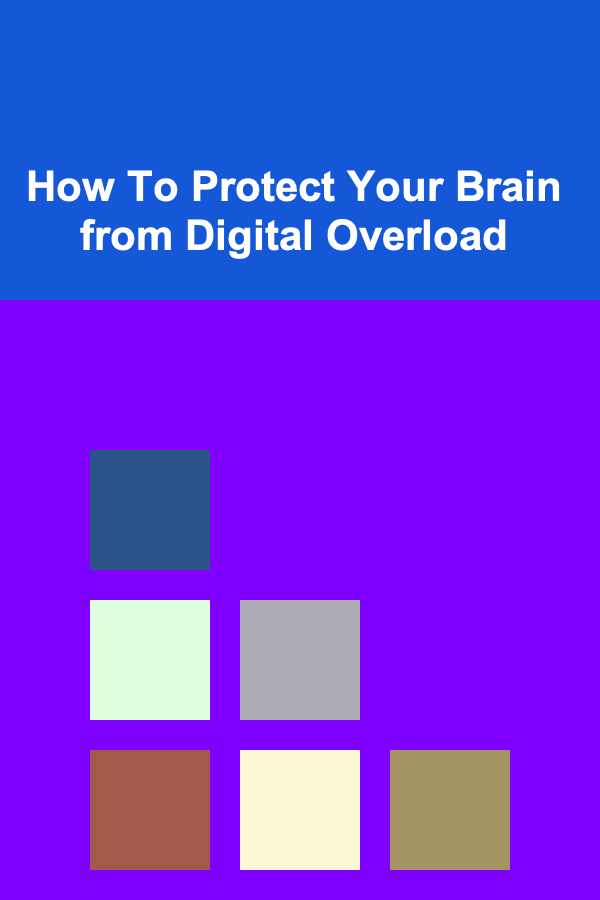
How To Protect Your Brain from Digital Overload
ebook include PDF & Audio bundle (Micro Guide)
$12.99$8.99
Limited Time Offer! Order within the next:

In the digital age, technology has transformed the way we live, work, and communicate. Our reliance on digital devices is undeniable, with smartphones, tablets, computers, and other gadgets becoming integral parts of our daily lives. However, with this convenience comes a downside: digital overload. The constant barrage of information, notifications, and digital stimuli can overwhelm our brains, leading to stress, burnout, and cognitive fatigue. In this article, we explore how digital overload affects the brain and how we can protect our mental well-being in this hyper-connected world.
What Is Digital Overload?
Digital overload, also known as digital fatigue or information overload, refers to the overwhelming sense of being constantly bombarded with information through digital devices. It can manifest as the feeling of being mentally exhausted, distracted, and unable to focus due to the sheer volume of digital content we encounter daily. This overload often leads to a sense of stress and anxiety, as our brains struggle to process and filter the vast amounts of data we receive.
Digital overload is exacerbated by the 24/7 connectivity provided by the internet and social media. We are constantly checking emails, social media updates, news feeds, and instant messages, all while juggling work and personal tasks. This constant stream of information can create a sense of urgency and pressure, affecting our ability to think clearly and make decisions.
The Impact of Digital Overload on the Brain
Our brains are not designed to handle the constant flow of digital information. While humans have evolved to process and store information in a way that allows us to make decisions and respond to our environment, the digital age has introduced a level of complexity that can overwhelm our cognitive resources. The effects of digital overload on the brain are numerous and far-reaching, and they can impact both our mental and physical health.
1. Cognitive Fatigue and Decreased Focus
One of the most immediate effects of digital overload is cognitive fatigue. Our brains are constantly working to process and absorb information, but when we are exposed to too much data, our cognitive resources become depleted. This can lead to difficulty concentrating, reduced problem-solving abilities, and a general sense of mental exhaustion. The inability to focus on one task at a time, often referred to as "multitasking," is a direct result of digital overload.
The more frequently we switch between tasks, such as checking emails while responding to text messages or scrolling through social media during work hours, the harder it becomes to maintain focus. Studies have shown that multitasking actually reduces productivity and can increase the time it takes to complete tasks.
2. Stress and Anxiety
The constant influx of notifications, emails, and social media updates can create a sense of urgency, making us feel as though we must respond immediately. This pressure to stay connected and be available at all times can lead to chronic stress and anxiety. Digital overload can activate the brain's stress response, releasing cortisol, the hormone associated with stress. Over time, this can lead to heightened levels of anxiety, burnout, and feelings of being overwhelmed.
The comparison culture fostered by social media can also contribute to stress. Constantly seeing curated images of other people's lives can lead to feelings of inadequacy or FOMO (fear of missing out), which can further contribute to anxiety and mental exhaustion.
3. Sleep Disruptions
Excessive screen time, particularly before bed, has been shown to interfere with sleep patterns. The blue light emitted by screens suppresses the production of melatonin, a hormone that regulates sleep. As a result, people who engage in late-night digital activities often find it difficult to fall asleep or stay asleep. Poor sleep quality can have a direct impact on cognitive function, mood regulation, and overall mental health.
Sleep deprivation due to digital overload can lead to decreased attention span, impaired memory, and emotional instability. Chronic lack of sleep can even contribute to more serious mental health conditions, such as depression and anxiety disorders.
4. Decreased Memory and Learning Abilities
The constant exposure to digital information can also affect our ability to retain and recall information. When we are constantly switching between tasks or consuming large amounts of information, our brains have less time to encode and store the data in long-term memory. This phenomenon, known as "cognitive overload," can make it more difficult to retain new information and can decrease learning abilities.
The ease with which we can search for information online has also led to a decline in our ability to remember facts or perform mental calculations. Instead of relying on our memory, we often turn to digital devices for quick answers, which can reduce our reliance on cognitive processes like critical thinking and problem-solving.
5. Impact on Relationships and Social Interactions
While digital devices have made it easier to stay connected with friends and family, digital overload can have a negative impact on our relationships. Constantly checking our phones or being distracted by digital content can make us less present in our interactions with others. This lack of face-to-face connection can lead to feelings of isolation and emotional disconnection.
Moreover, social media can create unrealistic expectations for relationships, leading to dissatisfaction or feelings of inadequacy. The pressure to present a perfect image online can contribute to anxiety and affect self-esteem.
How to Protect Your Brain from Digital Overload
Given the significant impact of digital overload on our brains, it's essential to take proactive steps to protect our mental well-being. Here are several strategies to help reduce digital overload and maintain a healthy balance in our digital lives:
1. Set Boundaries and Limit Screen Time
One of the most effective ways to combat digital overload is to set boundaries around screen time. Designate specific times of day for checking emails, social media, and other digital content. Avoid engaging with digital devices immediately upon waking up or before going to bed. Instead, establish morning and evening routines that promote mindfulness and relaxation, such as stretching, journaling, or reading a book.
Use tools and apps that track your screen time and set limits on the amount of time you spend on certain activities. For example, you can limit your social media usage to 30 minutes per day or set a timer for work-related tasks to avoid distractions.
2. Practice Digital Detox
A digital detox involves taking a break from all digital devices for a set period of time. This can be a few hours, a day, or even a weekend. A digital detox allows your brain to rest and recover from the constant stimulation of digital information. Use this time to engage in offline activities that promote relaxation, such as spending time in nature, practicing mindfulness, or engaging in creative hobbies.
By taking regular breaks from digital devices, you can reset your brain and reduce the mental fatigue caused by constant connectivity.
3. Engage in Mindfulness and Meditation
Mindfulness practices, such as meditation and deep breathing exercises, can help calm the mind and reduce stress. By focusing on the present moment and becoming more aware of your thoughts and feelings, you can train your brain to be less reactive to digital stimuli. Regular mindfulness practice has been shown to improve focus, increase emotional resilience, and reduce anxiety.
Consider incorporating mindfulness into your daily routine, such as taking a few minutes each day to practice breathing exercises or doing a guided meditation session.
4. Create a Tech-Free Zone
Designate certain areas of your home or workspace as tech-free zones. For example, you can make your bedroom a device-free space to improve sleep quality or create a specific area where you can focus on work without distractions. By creating boundaries between your physical space and digital devices, you can create a healthier environment that promotes relaxation and productivity.
5. Limit Multitasking and Practice Single-Tasking
Multitasking may seem like a productivity booster, but it can actually hinder cognitive function and increase stress levels. Instead of switching between tasks constantly, focus on one task at a time. Use tools like the Pomodoro technique to break work into focused intervals, allowing for short breaks in between. This method promotes concentration and helps prevent mental fatigue.
6. Be Selective About Information Consumption
Not all digital information is necessary or helpful. Be selective about the content you consume and prioritize quality over quantity. Unfollow or mute accounts that create unnecessary stress or distractions, and avoid mindlessly scrolling through social media feeds. Curate your digital environment to focus on content that is meaningful, educational, or relaxing.
Consider subscribing to newsletters or following accounts that provide value, such as professional development resources, news summaries, or personal growth tips. By reducing the noise and focusing on relevant content, you can protect your brain from digital overload.
7. Engage in Physical Activity
Physical activity is essential for maintaining mental and physical health. Regular exercise helps reduce stress, improve mood, and increase cognitive function. It also provides a much-needed break from screen time, allowing your brain to recharge and recover. Whether it's going for a walk, practicing yoga, or hitting the gym, make time for physical activity each day.
Exercise also promotes better sleep, which is crucial for cognitive function and emotional well-being.
8. Maintain Social Connections Offline
While digital devices make it easier to stay connected, it's important to maintain meaningful relationships in the physical world as well. Make time to engage in face-to-face interactions with friends and family. These in-person connections provide emotional support, reduce feelings of isolation, and promote well-being.
Consider scheduling regular social activities, such as going for coffee with a friend or attending a family gathering, to nurture your relationships outside of the digital realm.
Conclusion
Digital overload is a growing concern in our hyper-connected world. The constant bombardment of information and digital stimuli can overwhelm our brains, leading to stress, anxiety, and cognitive fatigue. However, by taking proactive steps to manage our screen time, engage in mindfulness practices, and create boundaries around technology, we can protect our mental well-being and maintain a healthy balance in our digital lives.
The key to managing digital overload is to be intentional about how we use technology. By setting limits, taking breaks, and prioritizing offline activities, we can safeguard our brains from the negative effects of constant connectivity. In doing so, we can enhance our cognitive abilities, reduce stress, and improve our overall quality of life.

How to Clean Your Shower and Keep It Mold-Free
Read More
How to Create a Checklist for A/B Testing Your Website
Read More
How to Create Engaging Video Production Projects for Students
Read More
How to Design a Space-Saving Home Office in a Tiny Room
Read More
How to Use Lighting to Create a Focal Point in Your Dining Room
Read More
How To Discover the Caves of Lascaux
Read MoreOther Products

How to Clean Your Shower and Keep It Mold-Free
Read More
How to Create a Checklist for A/B Testing Your Website
Read More
How to Create Engaging Video Production Projects for Students
Read More
How to Design a Space-Saving Home Office in a Tiny Room
Read More
How to Use Lighting to Create a Focal Point in Your Dining Room
Read More